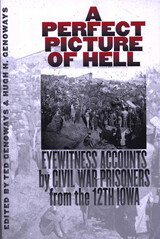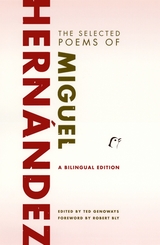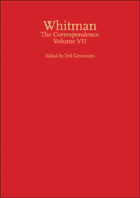
From the shooting of an unarmed prisoner at Montgomery, Alabama, to a successful escape from Belle Isle, from the swelling floodwaters overtaking Cahaba Prison to the inferno that finally engulfed Andersonville, A Perfect Picture of Hell is a collection of harrowing narratives by soldiers from the 12th Iowa Infantry who survived imprisonment in the South during the Civil War.
Editors Ted Genoways and Hugh Genoways have collected the soldiers' startling accounts from diaries, letters, speeches, newspaper articles, and remembrances. Arranged chronologically, the eyewitness descriptions of the battles of Shiloh, Corinth, Jackson, and Tupelo, together with accompanying accounts of nearly every famous Confederate prison, create a shared vision

Now, for the first time, Ted Genoways makes Hernández's extraordinary oeuvre available in an authoritative bilingual edition. Featuring some of the most tender and vigorous poetry on war, death, and social injustice written in the past century, nearly half of the poems in this volume appear in English for the first time, making it the most comprehensive bilingual collection of Hernández's work available. Arranged chronologically, The Selected Poems of Miguel Hernández presents Hernández's remarkable emotional range as well as his stylistic evolution from the Romantic shepherd poet to poet of the prison cell. Thorough annotations and introductory essays illuminate the biographical basis for many of Hernández's poems, while a foreword by Robert Bly and an afterword by Octavio Paz provide a striking frame for the work of this essential poet.
"What a victory it is to watch springing forth from our murky thicket of half-commercialized poetry the silver boar of Hernández's words-to see the world of paper part so as to allow the language tusks and shoulders to emerge, shining, pressed forward by his genius. This generous selection of Miguel Hernández's work, arranged, shepherded, and largely translated by Ted Genoways, is an immense gift for which all of us should be grateful."-from the Foreword by Robert Bly
"To gather Hernández's poetry in such a large volume is to bring one of the 20th century's most important poets to life again. Without Hernandez, the world community of poetry would not be what it is today. The Selected Poems must be read if vital poetry is to continue another 100 years, with Hernández's voice as a cherished example of why great poetry is timeless."—Ray González, Bloomsbury Review
"As Philip Levine write in The Kenyon Review, Hernández is 'one of the great talents of the century,' and this collection is a good place to discover (or rediscover) his moving verses."—Virginia Quarterly Review
"Vivid, often volatile imagery describes wrenching emotions and events in The Selected Poems of Miguel Hernández: A Bilingual Edition. . . . Raw, passionate, despairing and celebratory, these poems are a true discovery."—Publishers Weekly
"Arranged in three chronological sections, the poems presented are not the complete works, but they are a large and representative sampling of the best. This is certainly the most comprehensive bilingual edition of Hernández's poetry available. In addition to the poems, the editor includes eight illustrations, important prefatory materials, and a short list of references, and an epilogue by Octavio Paz."—Choice

Now, more than forty years after the inaugural volume’s original publication, Ted Genoways brings scholars the latest volume in Walt Whitman: The Correspondence. Incorporating all of the letters Miller had collected before his death in 2001 and combining them with more than a hundred previously unknown letters he himself gathered, Genoways’s volume is a perfect accompaniment to Miller’s original work.
Among the more than one hundred fifty letters collected in this volume are numerous correspondences concerning Whitman’s Civil War years, including a letter sending John Hay, the personal secretary to Abraham Lincoln, a manuscript copy of “O Captain, My Captain!” Additional letters address various aspects of the production of Leaves of Grass, the most notable being an extensive correspondence surrounding the Deathbed Edition, gathered by Whitman’s friend Horace Traubel, and reproduced here for the first time. Most significantly, this volume at last incorporates Whitman’s early letters to Abraham Paul Leech, first published by Arthur Golden in American Literature in 1986. The revelations contained in these letters must be considered among the most important discoveries about Whitman’s life made during the last half of the twentieth century.
Regardless of whether their significance is great or small, immediate or long-term, each new piece of Whitman’s correspondence returns us to a particular moment in his life and suggests the limitless directions that remain for Whitman scholarship.
READERS
Browse our collection.
PUBLISHERS
See BiblioVault's publisher services.
STUDENT SERVICES
Files for college accessibility offices.
UChicago Accessibility Resources
home | accessibility | search | about | contact us
BiblioVault ® 2001 - 2024
The University of Chicago Press









